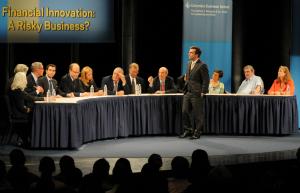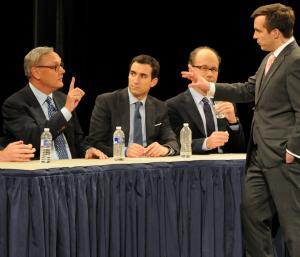Financial Innovation: A Risky Business?
Professor Robert J. Jackson Jr. moderates a debate on the value of financial markets-and what role the government should play.
New York, December 18, 2012—Columbia Law School Professor Robert J. Jackson Jr. moderated a lively debate on financial innovation before a panel of experts including Congressman Barney Frank, The New York Times’ Andrew Ross Sorkin, Nobel Laureate Robert Solow, and Gary Gensler, chairman of the Commodity Futures Trading Commission.
| Professor Robert J. Jackson Jr. and the panel |
Jackson ran the debate using the Fred Friendly Socratic dialogue format, which typically consists of 12-18 people, seated around a U-shaped table, answering questions posed to them by a moderator about a hypothetical situation. The technique compels participants to confront the choices they would make in complicated cases. The approach was devised by Friendly, the late president of CBS television news and a professor at the Columbia School of Journalism.
The series of hypotheticals Jackson posed to panelists reflected the hard questions now facing the financial services industry. The scenarios drew thoughtful—and often surprising—responses from the panelists, who also included Blythe Masters, JPMorgan’s Head of Global Commodities; former Bain Capital Managing Director Ed Conard; and Bloomberg columnist Caroline Baum, among others.
Jackson’s questions explored both the promise and perils of financial innovation—and the potential that new financial tools hold for advancing the public good.
The Sept. 7, 2012 debate or seminar, titled “Financial Innovation: A Risky Business?,” was presented by the Sanford C. Bernstein & Co. Center for Leadership and Ethics, in partnership with Fred Friendly Seminars, as part of Columbia Business School’s Individual, Business and Society (IBS) curriculum.
| (from left) Ed Conard, Andrew Ross Sorkin, David Abrams of Abrams Capital, and Professor Robert Jackson Jr. |
Jackson, the Law School’s Milton Handler Fellow, co-directs the Ira M. Millstein Center for Global Markets and Corporate Ownership, which studies global financial markets and the increasingly fractured nature of corporate ownership. In 2012, Columbia’s students awarded Jackson the 2012 Willis L.M. Reese Prize for Excellence in Teaching. Before joining the Columbia Law School faculty in 2010, Jackson served as an adviser to senior officials at the Department of the Treasury during the financial crisis and in the Office of the Special Master for TARP Executive Compensation. His research, which has been noted in The New York Times, The Wall Street Journal, and on National Public Radio, emphasizes empirical study of executive compensation and corporate governance.

